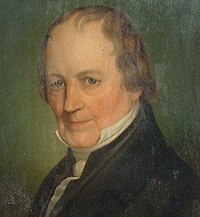Friedrich Adolf Krummacher


Friedrich Adolf Krummacher (born July 13, 1767 in Tecklenburg , † April 4, 1845 in Bremen ) was a German Protestant theologian .
Life
Friedrich Adolf Krummacher ( Friedrich Adolph Krummacher according to contemporary spelling) was the son of the lawyer and Tecklenburg mayor Friedrich Jakob Krummacher. He was the older brother of Gottfried Daniel Krummacher and the father of Friedrich Wilhelm Krummacher and Emil Wilhelm Krummacher .
He studied theology from autumn 1784 at the then Protestant-Reformed grammar school Academicum in Lingen , then from 1786 theology and philosophy in Halle . In 1788 he passed his exams in Tecklenburg and in 1790 became vice principal at the Hammonense grammar school in Hamm . From 1793 to 1801 Krummacher was rector at the Adolfinum Moers grammar school . After obtaining his doctorate in theology in 1801, he became professor for Reformed theology in Duisburg , since 1802 with an additional teaching position for eloquence .
In 1805 Krummacher published his popular parables . After the downfall of Duisburg University from 1807, he worked as a pastor in Kettwig an der Ruhr (today: Essen ), then from 1812 as General Superintendent of Anhalt-Bernburg . Krummacher's time in Bernburg was set by his son-in-law, the painter Wilhelm von Kügelgen, in the famous memories of an old man's youth , in which he called Friedrich Adolf Krummacher the Ätti . In 1824 he became pastor at St. Ansgarii in Bremen, where he finally retired in 1843 and died two years later.
Krummacher was influenced by Johann Gottfried von Herder and Matthias Claudius and belonged to the revival movement , which was critical or hostile to rationalism . In Duisburg he was one of the group around Johann Gerhard Hasenkamp , whereas Johannes Clauberg (1622–1665) had introduced Descartesian rationalism as rector of the university , which Heinrich Adolph Grimm represented at the university in Krummacher's time .
Krummacher's lyrics were partly set to music by Franz Schubert (see Die Nacht ); his chorals (for example, a flock and a shepherd ) were part of the German-language Protestant hymn books until the end of the 20th century .
Works
- Hymn to love. 1801.
- Parabolas. 3 vol., 1805-1817.
- About the spirit and form of evangelical history in historical and aesthetic terms. 1805.
- The children's world. Poem in four songs. 1806.
- Festival booklet. Tl. 1-3, 1808-1819.
- Apologists and Paramythias. 1809.
- The small word: And, a birthday party. 1811.
- The conqueror, a transformation. 1814.
- John. 1815.
- Apostolic letter to the Christian communities about what is needed for church improvement. 1815 (anonymous).
- Passion, death and resurrection of our Lord Jesus Christ. 1818.
- Prince Wolfgang zu Anhalt , a Reformation sermon. 1820.
- Correspondence between Asmus and his cousin. 1820.
- The free evangelical church, a greeting for peace. 1821.
- Pictures and pictures. 1823.
- Catechism of Christian Doctrine. 1823. Digitized version (1821 edition)
- The Christian elementary school in league with the church. 1823.
- St. Ansgar. 1826.
- The dove. 1828.
- The captain Cornelius. 1829.
- The story of the kingdom of God according to the scriptures, suggestive text to von Kügelgen's pictures. 4 issues, 1831–1845.
- Life of saint john. 1833.
- (Ed.) John Wesley's Life, the Origins and Spread of Methodism. Adapted from the English of Robert Southey. 2 vol., 1828.
- Letters. Gleanings. (posthumously) 1911.
See also
literature
- Arnold Wilhelm Möller: Friedrich Adolf Krummacher and his friends. Letters and life news. 2 volumes. Heyse, Bremen 1849, Vol. 2 online .
- Otto von Ranke: Krummacher, Friedrich Adolf . In: Allgemeine Deutsche Biographie (ADB). Volume 17, Duncker & Humblot, Leipzig 1883, pp. 240-243.
- Maria Krummacher: Our grandfather. A picture of life in letters. 2nd edition 1891 ( digitized version )
- Wilhelm von Kügelgen : childhood memories of an old man . Edited by Philipp von Nathusius . W. Hertz , Berlin 1870 digitized
- Bernhard Paul Schlemann: Friedrich Adolf Krummacher's youth and young man's years . Münster 1923 (typewritten; Münster, dissertation of Nov. 19, 1923).
- Maria Krummacher: Our grandfather, Ätti. A picture of Friedrich Adolf Krummacher's life created from his letters. New edition, 9th - 13th thousand. Koehler & Amelung, Leipzig 1926.
- Hans-Henrik Krummacher: Krummacher, Friedrich Adolph. In: New German Biography (NDB). Volume 13, Duncker & Humblot, Berlin 1982, ISBN 3-428-00194-X , pp. 123-125 ( digitized version ).
- Wilhelm von Kügelgen : civil life. The letters to brother Gerhard 1840–1867. Edited and with an introduction by Walther Killy . Beck, Munich 1990, ISBN 3-406-34210-8 .
- Jo Krummacher : Living God's kindness. For the 225th birthday of Friedrich Adolph Krummacher (July 13, 1767–4 April 1845). In: Deutsches Pfarrerblatt. 1992, ISSN 0939-9771 , pp. 290-292.
- Georg Rosenthal (ed.): Friedrich Adolf Krummacher and his time. Kulturstiftung, Bernburg 1996, ISBN 3-9805532-1-3 .
- Horst F. Rupp: "School as a church institution". Friedrich Adolf Krummacher (1767–1845) and his work “The Christian elementary school in league with the church” (1823). In: Horst F. Rupp (Hrsg.): Think-worthy stations of religious education. Festschrift for Rainer Lachmann. IKS Garamond, Jena 2005, ISBN 3-938203-07-2 , pp. 163-180.
- Christiane Graß, Julia Husmann, Peter Marx: The beautiful Ruhr valley curvature. Friedrich Adolph Krummacher in Kettwig 1807–1812. Hummelshain Verlag, Essen 2011, ISBN 978-3-943322-00-2 .
- Johannes Friedrich Diehl: Friedrich Adolf Krummacher. In: Biographisch-Bibliographisches Kirchenlexikon (BBKL). Volume 4, Bautz, Herzberg 1992, ISBN 3-88309-038-7 , Sp. 714-715.
Web links
- Literature by and about Friedrich Adolf Krummacher in the catalog of the German National Library
- Friedrich Adolph Krummacher in the Lexicon of Westphalian Authors
| personal data | |
|---|---|
| SURNAME | Krummacher, Friedrich Adolf |
| ALTERNATIVE NAMES | Krummacher, Friedrich Adolph |
| BRIEF DESCRIPTION | reformed theologian |
| DATE OF BIRTH | July 13, 1767 |
| PLACE OF BIRTH | Tecklenburg |
| DATE OF DEATH | April 4, 1845 |
| Place of death | Bremen |